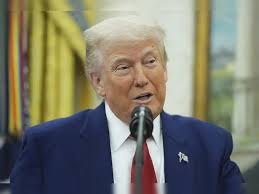International Emergency Economic Powers Act (IEEPA), 1977:

A U.S. federal court recently blocked President Donald Trump’s broad tariffs, ruling that the International Emergency Economic Powers Act (IEEPA) doesn’t give him authority to impose sweeping import taxes.
- International Emergency Economic Powers Act of 1977 (IEEPA) is a United States Act which was legislated on 28 October 1977.
- It gives the president broad powers to regulate various financial transactions upon declaring a national emergency.
- The IEEPA empowers the US President to proclaim an unusual and exceptional threat to the federal security, foreign policy, and economy of the United States that originates in whole or in considerable part outside the United States.
- It also empowers the President to restrict transactions and freeze assets in response to such a statement.
- In the case of an actual attack on the United States, the president has the authority to seize property associated with a nation, group, or individual that assisted in the attack.
- The IEEPA is governed by the terms of the National Emergencies Act (NEA), an emergency proclaimed under the Act must be renewed annually in order to stay in existence.
- IEEPA is a treaty that extends executive power over crises during times of peace.
- The IEEPA empowers the president to respond to uncommon and extraordinary risks to national security by altering the United States’ economic policy.
- The IEEPA serves as the governing authority for much of the US sanctions regime.
- The US Congress initially passed IEEPA in an attempt to restrict the emergency economic powers granted to the president under the Trading with the Enemy Act, a 1917 law that gave the president expansive authority to regulate international transactions during wartime.
- President Richard M. Nixon used the precursor statute to briefly impose a 10 percent universal tariff in 1971.
- No president has previously used IEEPA to put tariffs on imported goods.
- Instead, presidents have imposed tariffs in response to national security threats using Section 232 of a 1962 trade law.
- That legal provision differs from IEEPA in part because it requires an investigation and report that has to be issued within 270 days.
- The provision also focuses on certain imports that threaten to impair U.S. national security.




